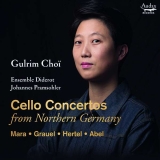Das Ensemble Diderot ist für seine Entdeckungen vor allem im Barockrepertoire und auch im Übergang zur Klassik bekannt, wobei das Schwergewicht bisher auf der Violine als Soloinstrument lag. Die aktuelle CD bietet deutlich in Richtung Vorklassik ausgerichtete Cellokonzerte von den Höfen aus Dresden und Berlin an. Je zwei Premieren und zwei bereits anderweitig eingespielte Werke geben der Cellistin Gulrim Choi, Mitglied des Ensembles, vor kammermusikalisch besetztem Kollegium die Bühne für diese Werke.
Johann Wilhelm Hertel ist neben Carl Friedrich Abel sicherlich der bekannteste Komponist. Ignác František Mara und Markus Heinrich Grauel, letzterer nicht zu verwechseln mit den Brüdern Graun, dürften wenig geläufig sein. Als komponierende Musiker waren sie in ihrer Zeit und in ihrem Umfeld jedoch anerkannt. Grauels Komposition mag in wenig rückwärtsgewandt, Abel dagegen für sein Umfeld sehr modern klingen. Bei Mara entfaltet sich theatralisches Pathos und Hertels Konzert lässt sich mit empfindsamem Charakter beschreiben. So bietet jedes der Werke einen eigenen Aspekt aus, der in der Zusammenstellung deutlich wird.
Gulrim Choi gibt diesen Stücken die spielerische Leichtigkeit, die dank ihrer technischen Fähigkeiten kein Problem sind. Doch fehlt den Werken trotz der angenehmen Charakteristik jedes Quäntchen Oberflächlichkeit. Sie verbinden musikalische Aussage mit reizvollem Auftreten. Und genau diese Elemente kann Gulrim Choi mit ihrem engagiert dichten Ansatz herausstellen. Damit gelingt es ihr, diesen Beitrag norddeutscher Komponisten für das Cello außerordentlich wirkungsvoll zu präsentieren.
Das Ensemble Diderot geht diesen Weg, wie immer lebhaft und anspruchsvoll aufbereitet, mit. Für die Basso continuo-Seite wird das Cembalo mal mit einer Barocklaute, dann wiederum mit einer deutschen Theorbe kombiniert, so dass sich auch auf dieser Ebene für den Zuhörer weitere zu entdeckende Hörpunkte ergeben.
The Ensemble Diderot is known for its discoveries especially in the Baroque repertoire and also in the transition to the Classical period, with the emphasis so far on the violin as a solo instrument. The current CD offers cello concertos from the courts of Dresden and Berlin that are already oriented towards the pre-classical period. Two premieres each and two works already recorded elsewhere give cellist Gulrim Choi, a member of the ensemble, the stage for these works together with a chamber music ensemble.
Johann Wilhelm Hertel is certainly the best known of the composers , along with Carl Friedrich Abel. Ignác František Mara and Markus Heinrich Grauel, the latter not to be confused with the Graun brothers, may be less familiar. As composing musicians, however, they were recognized in their time and environment. Grauel’s composition may sound a little backward-looking, while Abel’s sounds very modern for his environment. In Mara’s work, theatrical pathos unfolds, and Hertel’s concerto can be described as sensitive in character. Thus, each of the works offers its own aspect, which becomes clear in the compilation.
Gulrim Choi gives these pieces the playful lightness that is no problem thanks to her technical skills. Yet, despite their pleasant characteristics, the works lack any ounce of superficiality. They combine musical statement with charming appearance. And it is precisely these elements that Gulrim Choi is able to bring out with her committedly dense approach. She thus succeeds in presenting this contribution of North German composers for the cello extraordinarily effectively.
The Ensemble Diderot follows this path, as always lively and sophisticatedly prepared. For the basso continuo side, the harpsichord is sometimes combined with a baroque lute, then again with a German theorbo, so that on this level, too, there are further things for the listener to discover.






















